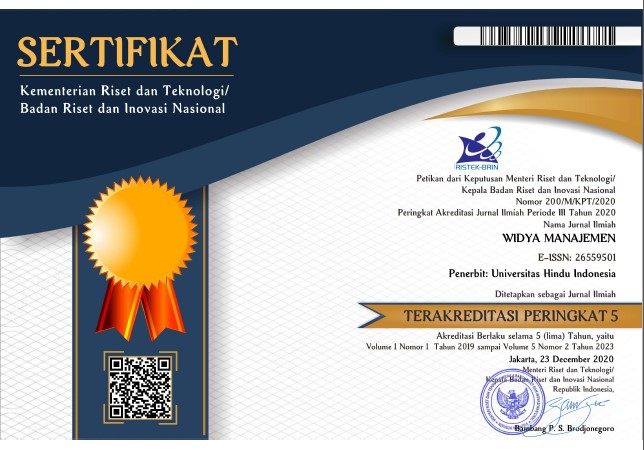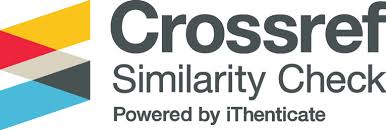Pengaruh E-Banking Service Quality dan Brand Image untuk Membangun E-Wom dan Niat Pelanggan Menggunakan E-Banking
(Studi Masa Covid di Bank Rakyat Indonesia)
Abstract
The COVID-19 pandemic has disrupted banking operations that are carried out directly to customers and increased the threat of physical contact for retail bankers and customers, as a result, the world is turning to Internet banking to continue routine transactions for bill payments, grocery purchases, and brand shopping. This study aims to determine the effect of e-banking service quality and brand image on Ewom and the effect of e-banking service quality, brand image, and EWOM on customer intentions to use e-banking at Bank BRI in Denpasar City. The variables studied in this study are e-banking service quality, brand image, E-wom, and customer intentions in using e-banking. The data used is primary data, namely the results or answers of respondents through questionnaires. The study employed a purposive sampling technique to gather data from BRI Bank customers in Denpasar City, with a total of 235 respondents participating. Path analysis was utilized as the analytical method. The findings indicated a favorable impact of E-banking service quality on electronic word-of-mouth (e-wom) at BRI Bank in Denpasar City. Additionally, E-banking service quality demonstrated a positive influence on customers' intentions to utilize BRI Bank E-Banking services in the same city. Likewise, the brand image variable exhibited a constructive effect on e-wom for BRI Bank in Denpasar City and also positively influenced customers' intentions to use BRI Bank E-Banking services. Ultimately, the e-wom variable was found to have a positive impact on customer intentions to engage with BRI Bank E-Banking services in Denpasar City.
References
Abedi, E., Ghorbanzadeh, D., & Rahehagh, A. (2020). Influence of eWOM information on consumers’ behavioral intentions in mobile social networks: Evidence of Iran. Journal of Advances in Management Research, 17(1), 84–109.
Abubakar, A. M., Ilkan, M., & Sahin, P. (2016). Marketing Intelligence & Planning, 34(5), 692-710.
Anouze, A. L. M., & Alamro, A. S. (2020). Factors affecting intention to use e-banking in Jordan. International Journal of Bank Marketing, 38(1), 86–112.
Ariani, F., Bachri, S., & Suardi. (2019). Pengaruh E - Service quality Terhadap Customer Satisfaction, Trust, Dan Dampaknya Pada Repeat Usage Pada Bni Mobile Banking Di Kantor Cabang Palu. Jurnal Katalogis, 6(3), 162.
Atul, L., N, B., Rachma, & Hufron, M. (2016). Pengaruh Kualitas Produk Dan Kepuasan Pelanggan Terhadap Electronic word of mouth (E-Wom) Pada Fashion Online Shop Joyism Di Instragram Oleh. E – Jurnal Riset Manajemen, X, 82–94.
Bauer. (2005). Measuring the quality of e-banking portals. International Journal of Bank Ma.
Chakraborty, U., & Bhat, S. (2018). Credibility of online reviews and its impact on brand image. Management Research Review, 41(1), 148–164.
Dewa, C. B. (2019). Pengaruh Kualitas Layanan Terhadap Citra Destinasi Desa Wisata Ketingan Dengan Electronic word of mouth Sebagai Variabel Pemediasi. Khasanah Ilmu - Jurnal Pariwisata Dan Budaya, 10(2).
Dwi Satmoko, T., Djoko, H., & Ngatno. (2018). Pengaruh Kualitas Pelayanan Terhadap Word of Mouth, Melalui Kepercayaan dan Kepuasan Konsumen Sebagai Variabel Intervening Pada Star Clean Car Wash Semarang. JIAB: Jurnal Ilmu Administrasi Bisnis Universitas Diponegoro, 5(1), 1–10.
Farzin, M., & Fattahi, M. (2018). eWOM through social networking sites and impact on purchase intention and brand image in Iran. Journal of Advances in Management Research, 15(2), 161–183.
Hartui, C. P. L. (2018). Analisis pengaruh layanan e-banking dan tingkat kepuasan nasabah dalam loyalitas nasabah dengan religiusitas sebagai variabel moderating (studi kasus BRI syariah KCP kudus). Fakultas Ekonomi Dan Bisnis Islam.
Jun, M., & Cai, S. (2001). The key determinants of Internet banking service quality: A content analysis. International Journal of Bank Marketing, 19(7), 276–291.
Lestari, H. C. P. (2018). Analisis Pengaruh Layanan e-banking dan Tingkat Kepuasan Nasabah Terhadap Loyalitas Nasabah Dengan Switching Barrier Sebagai Variabel Moderating (Studi Kasus BRI Syariah KCP Kudus).
Liao, S. H., Chung, Y. C., & Widowati, R. (2009). The relationships among brand image, brand trust, and online word-of-mouth: An example of online gaming. IEEM 2009 - IEEE International Conference on Industrial Engineering and Engineering Management, 2207–2211.
Ortiz, J., Chih, W. H., & Teng, H. C. (2017). Electronic word of mouth in the Taiwanese social networking community: participation factors. Internet Research, 27(5), 1058–1084.
Reza Jalilvand, M., & Samiei, N. (2012). The effect of electronic word of mouth on brand image and purchase intention. Marketing Intelligence & Planning, 30(4), 460–476.
Shankar, A., & Jebarajakirthy, C. (2019). The influence of e-banking service quality on customer loyalty: A moderated mediation approach. International Journal of Bank Marketing, 37(5), 1119–1142.
Sultan, P., & Wong, H. Y. (2019). How service quality affects university brand performance, university brand image and behavioural intention: the mediating effects of satisfaction and trust and moderating roles of gender and study mode. Journal of Brand Management, 26(3).
Susanto, A., Chang, Y., & Ha, Y. (2016). Determinants of continuance intention to use the smartphone banking services: An extension to the expectation-confirmation model. Industrial Management and Data Systems, 116(3), 508–525.
Reproduction Policy
Every author submitting articles to Widya Manajemen must make a statement that the manuscript is free from plagiarism and is not being considered and published in other journals.
Articles that have been published are copyrighted by the Program Studi Manajemen FEBP UNHI. For educational purposes, the contents of the article may be duplicated or reproduced as long as the source of the article is mentioned. Written requests must be submitted to the editor to obtain permission to republish the contents of the article for purposes other than educational purposes.
-----------------------------------------------------------------------------------------------------
Kebijakan Reproduksi
Setiap penulis yang menyerahkan artikel ke Widya Manajemen harus membuat surat pernyataan bahwa naskahnya bebas dari plagiarisme dan tidak sedang dipertimbangkan dan dimuat dalam jurnal lain.
Artikel yang telah dipublikasi menjadi hak cipta Program Studi Manajemen FEBP UNHI. Untuk tujuan edukatif, isi dari artikel dapat digandakan atau direpublikasi selama menyebutkan sumber dari artikel tersebut. Permintaan tertulis harus diajukan kepada editor untuk memperoleh ijin merepublikasi isi dari artikel untuk tujuan lainnya selain tujuan edukatif.






.jpg)









